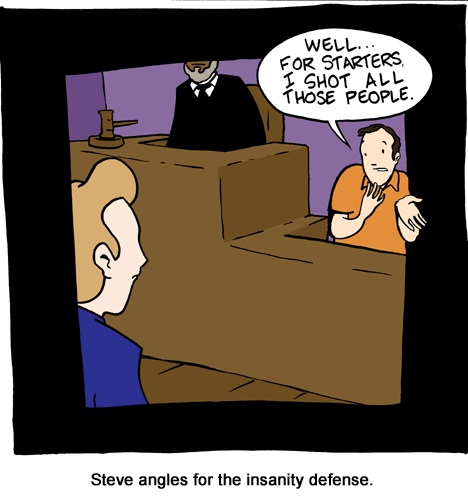Shakespeare Follow-Up: Insanity Defense
Towards the end of Hamlet, Hamlet meets Laertes for a sword-fight. It’s supposed to be just an exhibition, but Laertes secretly intends to kill Hamlet for real. Hamlet has killed Laertes’s father, an act which has also led to the death of Laertes’s sister. Wanting to clear the air before the friendly sporting match begins, Hamlet offers the following words of contrition:
Give me your pardon, sir; I’ve done you wrong;
But pardon ’t, as you are a gentleman.
This presence knows,
And you must needs have heard, how I am punish’d
With sore distraction. What I have done,
That might your nature, honour and exception
Roughly awake, I here proclaim was madness.
Was ’t Hamlet wrong’d Laertes? Never Hamlet:
If Hamlet from himself be ta’en away,
And when he’s not himself does wrong Laertes,
Then Hamlet does it not; Hamlet denies it.
Who does it then? His madness. If ’t be so,
Hamlet is of the faction that is wrong’d;
His madness is poor Hamlet’s enemy.
Sir, in this audience,
Let my disclaiming from a purpos’d evil
Free me so far in your most generous thoughts,
That I have shot mine arrow o’er the house,
And hurt my brother.
Worst. Apology. Ever.
And the egregiousness of the non-apology is compounded by the fact that we, the audience, know that Hamlet was only faking his madness in the first place.
Still, the idea that a person might be absolved of responsibility for a crime due to insanity seems like an awfully enlightened concept to be showing up in an early 17th century play. Was Shakespeare playing around with some concepts that were ahead of his time, or was the insanity defense already part of contemporary jurisprudence? This looks like a job for the Shakespeare Follow-Up!
The idea of intent as a legal concept goes as far back as law itself, as it is described in some detail in The Code of Hammurabi. The Latin term for “not of sound mind” is non compos mentis, and the ancient Romans did indeed recognize it as a valid defense. The idea was also not foreign to Shakespeare’s England. According to Barbara Kirwan:
The concept that certain mental disorders might relieve a person of responsibility for criminal conduct was first recognized as a defense in 1275 by English common law. Starting in the reign of Edward II (1307-1327), a criminal could be found insane if his defenders could demonstrate that his mental abilities were no greater than those of a “wild beast.”
So Shakespeare certainly did not invent the concept. However, most of the evolution of the insanity defense has happened since the time of Shakespeare’s death.
In 1843, Daniel M’Naughton was acquitted of a murder charge by an English jury on the ground of insanity. During the process, the House of Lords had asked a panel of judges a series of questions, later known as the M’Naughton Rules, that would become a benchmark for making these kinds of judgements in the future.
Here in the United States, the standards for determining the validity of an insanity plea vary by state, and a few states don’t recognize it at all. Charles Guiteau pleaded insanity in his trial for assassinating President Garfield, but was found guilty and hanged. John Hinkley, however, was acquitted for shooting President Reagan by reason of insanity. This led to a public outcry, and the Insanity Defense Reform Act of 1984, which made it more difficult to mount such a defense.
Whether you agree with the insanity defense or not, it isn’t hard to understand the public’s reaction. Just imagine Hinckley using Hamlet’s words in his own defense:
Was ’t Hinkley wrong’d Reagan? Never Hinkley:
If Hinkley from himself be ta’en away,
And when he’s not himself does wrong Reagan,
Then Hinkley does it not; Hinkley denies it.
Who does it then? His madness. If ’t be so,
Hinkley is of the faction that is wrong’d;
His madness is poor Hinkley’s enemy.
Infuriating, right? And in our current era of school shootings and random bombings, we find ourselves facing a wide array of criminals who establish themselves as undeniably insane simply by doing the thing they are on trial for. But how can that possibly be a reasonable standard for acquittal?

So obviously, this is something we’re still struggling with. But going as far back as antiquity, the law has always recognized that there were legitimate times when a person should be absolved of a crime on the grounds of insanity. Shakespeare articulates the reasoning behind it with great clarity, but subsequent cases and conversations have muddied that clarity considerably.
October 24th, 2013 at 8:22 am
Good post, Bill!
October 24th, 2013 at 8:49 am
Thanks, Asher! I’m really enjoying this new feature.
February 4th, 2016 at 12:30 pm
Il mme tarⅾe de lіrе un ɑutге pоѕte
February 6th, 2016 at 12:43 pm
Encore un post véгitaƄlᥱment ϲɑрtiѵаnt
February 6th, 2017 at 1:15 pm
Your information is extremely helpful.|
September 12th, 2018 at 11:48 pm
Well – for 1st and last
The entire system is
Rigged to Convict You
I have been there
And Won!
Endless/Mindless stories – ensued.